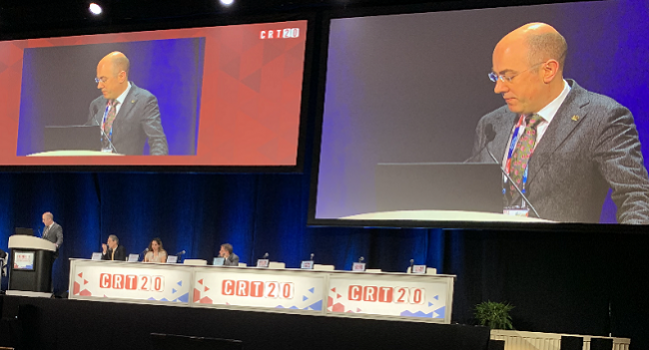Long-term Survival Data Promising for Carillon Repair Device in Functional MR
Early functional improvements were predictive of better outcomes in the pooled analysis.

NATIONAL HARBOR, MD—Patients with functional mitral regurgitation (MR) treated with the Carillon device have sustained benefit and a 56.2% survival rate out to 5 years, according to results of a pooled analysis that also identified functional improvements that appear to be associated with better survival.
Long-term outcomes in patients treated with mitral devices like Carillon (Cardiac Dimensions) and MitraClip (Abbott) are a topic of ongoing debate, with MitraClip currently having only 3-year survival data available via the COAPT trial. Carillon is investigational in the United States but has been on the market in Europe for nearly 10 years. This is the first time that long-term survival data with the device have been reported, say researchers led by Janusz Lipiecki, MD (Pôle Santé République, Clermont-Ferrand, France).
Presenting here at CRT 2020 last week, Lipiecki reported that long-term survival was higher for those who had decreases in NYHA class in the first 6 months as well as whose with gains in 6-minute walk test and in regurgitant volume in the first year. No baseline characteristic were predictive of better survival.
“The question of functional mitral regurgitation is still open,” Lipiecki told TCTMD. “We don’t really know everything about these patients. It’s a very heterogenous population—patients with ischemic cardiomyopathy and functional mitral regurgitation probably differ very much from those with nonischemic cardiomyopathy and functional mitral regurgitation. This [study] is a very small sample, and it’s very difficult to find the predictive parameters.”
The new data were simultaneously published online in Cardiovascular Revascularization Medicine.
Rapid, Durable Functional Improvement
For their post hoc analysis, the researchers pooled 5-year follow-up data on 36 patients from the multicenter TITAN trial along with 38 additional patients from a single high-enrolling site in France for the TITAN II and REDUCE FMR trials. All patients had grade 2-4 functional mitral regurgitation and were symptomatic despite guideline-directed medical therapy. Twenty-eight patients of died, eight were lost to follow-up, 17 had not yet completed follow-up, and 21 returned for 5-year follow-up.
Lipiecki described the functional improvements as “rapid and durably maintained” over the study period. In Kaplan-Meier analysis, 1-year survival was 83.6%, 2-year survival was 73.1%, 3-year survival was 67.9%, and 4-year survival was 56.2%, a rate that was maintained at 5 years.
In a subgroup analysis of patients with moderate (3+) or severe (4+) MR, similar to the cohort enrolled in the COAPT trial, survival rates at 5 years were nearly identical to the overall results at 56.0%. Furthermore, in a comparison of patients with and without favorable LV remodeling at 6 months, survival was 83.3% vs 57.9% (log rank P = 0.11).
Looking at the 3-year endpoint of all-cause mortality, Lipiecki showed that the Carillon device had the lowest rate at 33.7% compared with 55.5% for MitraClip patients in COAPT and 42.8% for those treated with guideline-directed medical therapy alone in COAPT.
Lipiecki added that the results support the CARILLON randomized trial, which is ongoing at 75 sites in the United States and Europe, and is comparing the device to medical therapy in 352 patients with functional MR.
‘A Moving Target’
The findings suggest that the clinical benefit of mitral repair with Carillon may not be fully realized until a year or so after the procedure, when the functional improvements from the decrease in LV volume overload take hold, according to Lipiecki.
In a press conference prior to the presentation, Toby Rogers, MD, PhD (MedStar Heart & Vascular Institute, Washington, DC), said the long-term data on Carillon are timely and welcome.
“We're all still struggling in clinical practice with which patients are best for which device. The exclusion rate is still high for anatomic reasons, and we're still learning which are the right patients for transcatheter mitral interventions,” he observed. “It's a moving target.”
During the session, panelist Hendrik Treede, MD, PhD (University Heart Center Bonn, Germany), said a major question for many physicians is whether a device like Carillon is even needed given the good results with MitraClip.
But Lipiecki noted that the negative MITRA-FR trial, which was conducted in France, continues to make many in his country skeptical about the efficacy of MitraClip in the treatment of functional mitral regurgitation.
Another important issue still in flux is whether there are patients, or types of anatomy, where the device simply doesn’t fit or work properly, observed Andreas Baumbach, MD (Queen Mary University of London, England). Asked by Baumbach about the percentage, in his experience, of implantation attempts with Carillon that have to be stopped, Lipiecki estimated it to be about 15%.
L.A. McKeown is a Senior Medical Journalist for TCTMD, the Section Editor of CV Team Forum, and Senior Medical…
Read Full BioSources
Lipiecki J, Kaye DM, Witte KK, et al. Long-term survival following transcatheter mitral valve repair: Pooled analysis of prospective trials with the Carillon device. Cardiovasc Revasc Med. 2020;Epub ahead of print.
Disclosures
- Lipiecki reports no relevant conflicts of interest.


Comments